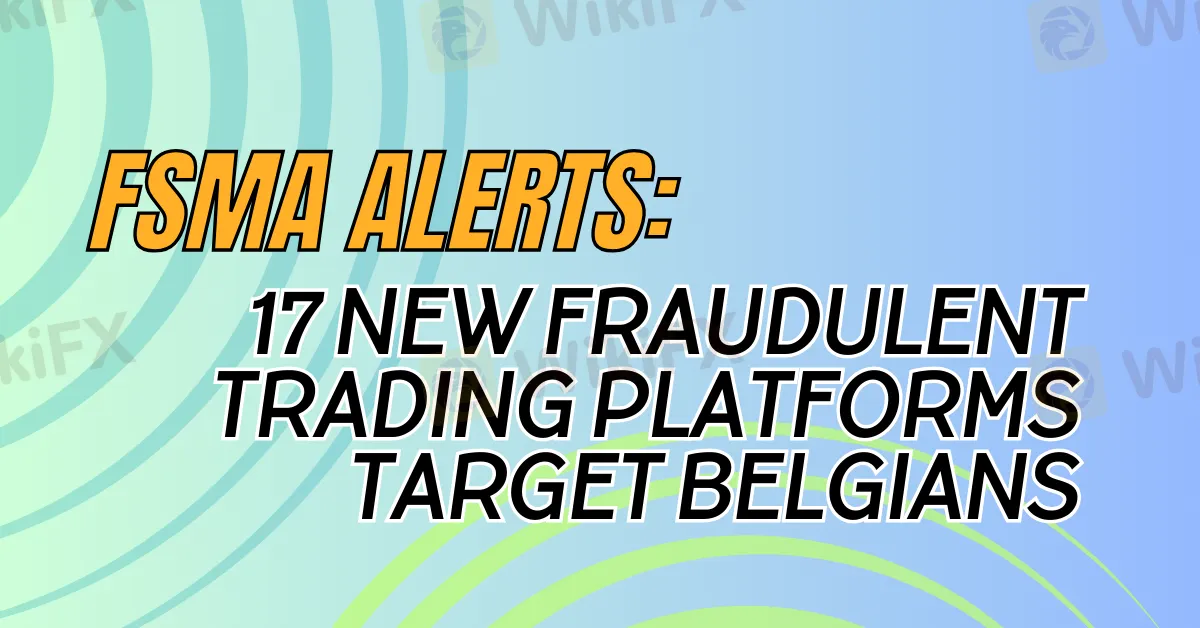简体中文
繁體中文
English
Pусский
日本語
ภาษาไทย
Tiếng Việt
Bahasa Indonesia
Español
हिन्दी
Filippiiniläinen
Français
Deutsch
Português
Türkçe
한국어
العربية
FSMA Alerts: 17 New Fraudulent Trading Platforms Target Belgians
Abstract:The FSMA issues a warning about 17 new deceptive trading platforms, combining cryptocurrency and FX/CFD providers, targeting Belgian citizens through enticing promises, emphasizing the importance of vigilance against financial fraud.

The Financial Services and Markets Authority (FSMA) has issued an updated advisory concerning deceitful online trading platforms specifically targeting Belgian citizens. The regulatory body has expanded its list to include 17 additional platforms, encompassing both cryptocurrency and FX/CFD trading providers.
The FSMA highlights that these trading platforms employ social media and online advertisements to attract potential victims, enticing them with promises of effortless profits through cryptocurrency trading, trading bots, or educational programs. Subsequently, victims, having provided personal information, face pressure from purported “experts” and “traders” to invest more funds, only to witness their investments disappear.

Among the recently identified entities in the warning are Bit 2.0 Urex, Bitcoin 360 AI, BitiCodes, BitIQ, and Immediate Connect. The comprehensive list is accessible on the FSMA website. The regulator has traced numerous victims back to instances where they submitted contact information on these platforms' websites.

While everything may seem in order initially, attempting subsequent withdrawals reveals unexpected obstacles. Victims are confronted with unforeseen 'taxes,' accompanied by additional fees, cautions the FSMA regarding common fraudulent practices.
The FSMA provides guidance on recognizing investment fraud, incorporating videos and flowcharts illustrating typical scam progressions. Individuals who suspect falling prey to these platforms can lodge a complaint directly with the FSMA or the police.
Several months ago, the FSMA alerted the public to a growing trend where fraudsters emulate prominent banks, a concern flagged since 2021. According to the authority, this deceptive tactic is on the rise.
Fraudsters utilize diverse strategies, reaching out to potential victims via phone or email, particularly those who have disclosed contact information through social media or promotional advertisements. They allure their targets with the promise of substantial returns and guaranteed capital through enticing investment opportunities, as outlined in a recent FSMA announcement.
The Belgian regulatory body notes a surge in complaints about individuals impersonating reputable financial entities, including BGL BNP Paribas Fortis, Bunq, Fineco, Revolut-épargne, Triodos, and the London Stock Exchange. These impostors craft email addresses mirroring those of legitimate banks to conceal their fraudulent activities.

Disclaimer:
The views in this article only represent the author's personal views, and do not constitute investment advice on this platform. This platform does not guarantee the accuracy, completeness and timeliness of the information in the article, and will not be liable for any loss caused by the use of or reliance on the information in the article.
Read more

Justice Served: Illegal Investment Scheme Ends in RM28 Million Repayment
The Kuala Lumpur High Court has ruled that a Singaporean businessman, Chan Cheh Shin, must return RM28 million to 122 Malaysian investors after the court determined that his investment operations were conducted illegally.

RM900,000 Scammed: The Hidden Dangers of Online Investment Schemes
A 53-year-old factory manager from Malaysia has fallen victim to an online investment scam, losing over RM900,000 of her savings. This case underscores the growing threat of online scams preying on unsuspecting individuals.

Tokyo Police Arrest 4 for Unregistered FX Trading Scheme
Four men in Tokyo were arrested for running an unregistered FX trading operation, collecting over ¥1.6 billion from 1,500 investors.

Doo Group Expands Its Operations with CySEC License
Doo Financial, part of Doo Group, receives a CySEC license, allowing FX/CFD services in Europe. This strengthens its global presence and regulatory standards.
WikiFX Broker
Latest News
Why Even the Highly Educated Fall Victim to Investment Scams?
Warning Against Globalmarketsbull & Cryptclubmarket
BSP Shuts Down Uno Forex Over Serious AML Violations
ACY Securities Expands Global Footprint with South Africa Acquisition
Tokyo Police Arrest 4 for Unregistered FX Trading Scheme
Rupee gains against Euro
Axi Bids AUD 52M to Acquire Low-Cost Broker SelfWealth, Outbidding Competitor Bell Financial
Crypto Influencer's Body Found Months After Kidnapping
US Regulators Tighten Oversight on Bank Anti-Money Laundering Efforts
Doo Group Expands Its Operations with CySEC License
Currency Calculator


